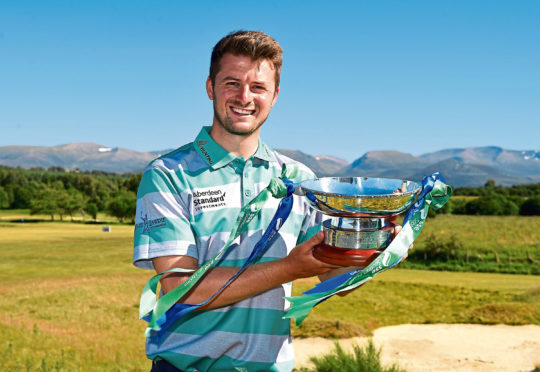You can’t expect unanimity on anything in today’s world. Opinions are everywhere, and thanks to social media, everyone now gets to share theirs.
Time was when it was just your reasonable and informed newspaper columnist who got to express their cogent thoughts on a regular basis. We’re still here, of course, if not consistently reasonable or informed, but we’re also joined by strident voices on social media whose knees are never happy unless they’re jerking.
Last week you may have got the impression that Scottish Golf (the governing body AND the game generally) was in terminal crisis.
However you may have also noticed others proclaiming the amazing achievements of our players with twitter hashtags like #scotsonfire.
Which is true? You know I’m going to say neither.
First, the crisis, largely borne of no Scottish players qualifying for the last 16 of the Amateur Championship at Royal Aberdeen last week. This was regrettable, no question, but to anyone who pays the slightest attention to the amateur scene, not remotely a surprise.
It’s not a great crop right now. Our men’s amateur game lost its three best players – Connor Syme, Robert MacIntyre and Liam Johnston – to the pros last year. Nothing odd or bad about that, in fact it’s all part of the natural and cyclical process of elite golf.
Speak privately to coaches and administrators and they’ll admit that they’ve seen for some time a fallow year was coming. There was hope some might kick on; for example Sandy Scott from Nairn is still only 19 and may yet do.
Now, this unquestionably is the responsibility of Scottish Golf’s development programmes and reflects on them. But unless you really expect or insist that they provide a seamless conveyor belt of top class talent – and think that’s in any way reasonable – you can’t accuse them of terminal failure.
Using the Amateur as a benchmark is hugely flawed anyway. Scots have reached the final five times in the last eight years, not exactly a catalogue of crisis, but the old championship – much as I love covering it – is not an accurate measurement of anything.
Two illustrative questions. How many amateur champions have gone on to be major winners since the First World War? And how many in the last 25 years have gone on to be European Tour winners?
The answer to the first question is three; namely Bobby Jones, Jose Maria Olazabal and Sergio Garcia. The answer to the second question is five – Garcia, Mikko Ilonen, Graeme Storm, Michael Hoey and Matteo Manassero.
If you’re looking to point the finger at anyone’s underachievement using the Amateur Championship, you’re looking the wrong way. In the European Tour and Challenge Tour, the evidence is far less circumstantial.
I missed the Amateur last week and instead attended the SSE Scottish Hydro Challenge at Aviemore, because I decided Spey Valley was far more likely to produce a good Scottish story.
David Law, a favourite of mine since I saw him bespectacled and gawky winning the Scottish Boys in 2009, duly won, but – you’ll be surprised to learn – I’m not going to claim prescience.
Many of my colleagues in the Scottish golfing press made the same decision, for the same reason – there are a decent crop of young Scots on the Challenge Tour right now with a chance of winning tournaments.
As well as Law, MacIntyre, Johnston (who has already won on the Challenge Tour this year), Grant Forrest, Ewen Ferguson and Jack McDonald all have some promise.
On the main tour, our two rookies are finding their feet. Connor Syme finished second in Austria, and Bradley Neil has a couple of better results in the last month.
But clearly, anyone would be fairly delusional to claim that a couple of wins and two second places (by Forrest) on the Challenge Tour plus Connor finishing runner-up in a second tier big Tour event – however encouraging that was – amounts to #scotsonfire.
There have been no Scottish European tour wins since Richie Ramsay in Morocco more than three years ago. No men’s majors since Paul Lawrie at Carnoustie in 1999. Those are far better sticks to bash Scottish Golf with.
But how much of it is their blame? There’s been a steady stream of competitive winners on the amateur scene who have failed to kick on in the pros.
All of them had talent, and most of them got financial and resource backing from the central body. Law, who is now 27, is a fairly good example.
David has been mentored by our last men’s major champion Lawrie his entire career. He’s had fantastic support. But this weekend was his first win in 100 Challenge Tour events.
He says himself, it’s been in his own head that’s the key. And this is crucial to understand; for all the entourages modern pro golfers have, it’s basically an individual pursuit.
There is no development programme that will produce a stream of winners. It really is all about guys themselves, and what they have in their top two inches.
